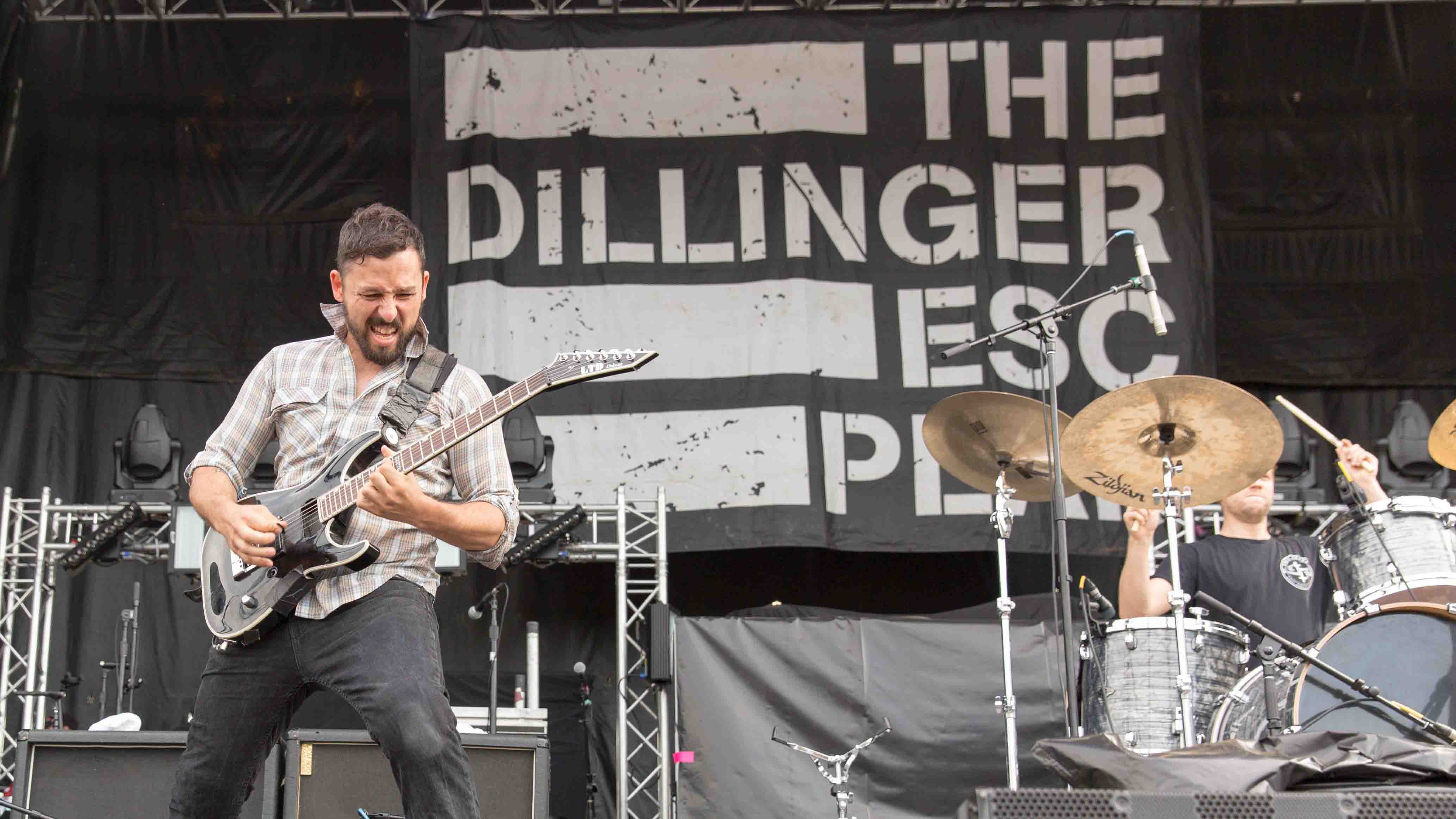Ben Weinman talks Dillinger Escape Plan's origins, Dissociation and destiny
Guitar maverick on gear, fusion and the future of the alt-metal titans

Dissociation
"When Dillinger started in the late 90s, I had already been completely desensitised to extreme music," explains Ben Weinman, guitarist and mastermind of experimental technical metallers Dillinger Escape Plan, "none of that stuff was interesting any more because I wasn't hearing anything that was really different."
With this in mind, it's not hyperbole to say that Dillinger Escape Plan are one of the few guitar bands of the past 25 years to make a total and radical break with the music of the past and forge a unique sound.
As immediately recognisable as the gauzy swirl of Kevin Shields in the shoegaze world, Dillinger's angular stabs of guitar, metallic riffing and face-melting solos - whose technicality is shrugged off by Ben: "how I excelled as a player was I always wrote stuff I couldn't play" - were as influential in metal as My Bloody Valentine were in indie, and they have spawned countless imitators, iterations and acolytes.
There weren't new bands or old bands creating new albums that were pushing anything [new], so I started searching different places for inspiration
At the centre of it all, though, is Weinman, the sparky yet thoughtful powerhouse that has kept Dillinger going for nearly 20 years.
"There weren't new bands or old bands creating new albums that were pushing anything [new], so I started searching different places for inspiration," says Ben, describing his early frustration with the metal scene.
"I had already listened to every single extreme death-metal band you could get, and I'd look for the most extreme, satanic, pissed-off music you could find in any weird catalogue and I'd buy it."
Don't Miss

Organised chaos
Finding eventual refuge in fusion such as King Crimson, Mahavishnu Orchestra and John McLaughlin, Ben's interest in jazz guitar has always been bubbling away under the surface of Dillinger, but on new LP Dissociation tracks like Low Feels Blvd, they finally appear at the fore.
"The truth is that all that stuff from the very beginning was a huge influence on Dillinger - I think we just hid it better,” Ben says.
“As we felt that our listeners were more prepared to hear that stuff in a naked way, I guess we've started to do it a little more literally than before."
Similarly, his interest in electronic music like Squarepusher and Venetian Snares has guided his path as a guitarist.
"I was inspired by these new forms of music that were really stimulating me a lot,” he reasons.
“Some of this electronic music sounded so random, but the more you listened to it, the more it made sense, and actually had intention."
Not only that, but Ben sensed a kindred spirit in their complex and ostensibly chaotic arrangements.
The way I've heard Dillinger described most throughout the years is 'organised chaos'
"The way I've heard Dillinger described most throughout the years is 'organised chaos', you know?” he laughs.
“To the layman person, it sounds like a mess, but for someone who takes the time to look into it and work on it and listen to it, they can tell that every note has its place and it's really intentional."
His enthusiasm for the geek electro of Aphex Twin meanwhile was revealed back in 2002 on their Irony Is A Dead Scene EP, when Dillinger and Mike Patton covered Aphex Twin's Come to Daddy.
"Richard James's way of doing things was very punk," Ben offers by way of explanation.

Date with destiny
When he describes the band in its current form, Ben is enthusiastic, speaking of how the music scene has to some extent caught up with them, and that Dillinger are now getting some of the recognition they deserve.
It may come as a surprise, then, to learn - as fans did when new album Dissociation was announced - that this will be the final Dillinger Escape Plan record, with the band intending to go out on a high.
"The vibe around Dillinger is amazing," Ben admits, "but in a way, that's more reason to say, 'let's control the destiny of this band' and close the book in a way that is respectable."
Though Ben doesn't touch on it, their extreme live shows, which have taken their toll in broken bones, as well as him and Greg living on opposite coasts of the US are probably factors, too.
There's also the fact that Ben is still the driving force behind the writing, production and recording process.
YouTube : RMV/REX/Shutterstock
"I do pretty complex and detailed demos... then I'll send it to our drummer Billy to start familiarising him with some of the ideas,” he explains.
“Then the next step is usually him coming over and us getting in a room with some combination of premeditated riffs already planned out and structured combined with real improv jamming to make sure that it feels right and that the transitions are natural and the speeds are right.
A big part of our demoing is not only the songs, but making sure the energy is there
“A big part of our demoing is not only the songs, but making sure the energy is there. Liam [Wilson, bass] will work on gluing it all together. Sometimes the bass is what those songs need to make them make sense to Greg. It gives him a better idea of what melodies or whatever might be in there, because there's so many notes happening.
“When Greg gets it, he's hearing it almost like a fan would hear it for the first time, so he's really able to react, which I think is exciting, without any idea of where the song is coming from or how it was started, and I think that's really interesting."
Ben muses on how this process means that he can be surprised by how a track turns out, for example hearing Wanting Not So Much As To come back from Greg with a spoken-word vocal.
"That's a perfect example," he agrees, "because it's the sort of thing you might expect a completely different style of singing over, but then you hear it back and you feel a completely different energy from hearing the song than you had intended when it was just music."

Orchestral manoeuvres
At the time the break-up was announced, many wondered if Ben's new supergroup Giraffe Tongue Orchestra, which boasts Thomas Pridgen (formerly of Mars Volta), alongside Mastodon's Brent Hinds and Alice In Chains' William DuVall, was related to the split, but that's not the case.
Ben says that despite its high-profile membership and side-project status, there will be a future for GTO beyond their debut record, Broken Lines.
"We want to explore the live thing more, as we really had a good time doing it at Reading and Leeds [Festivals]. There seems to be a cool chemistry that satisfies something our other bands don't."
But he's realistic about how busy all the respective players are.
"I think we'd like to make more music together, and we probably will at some point... but I'm tying things up with Dillinger... and William is going to be out [on tour] with Alice In Chains."
This soft-touch approach shouldn't be a surprise, as the project initially came about organically over an extended period.
"Brent and I have known each other over 15 years, toured together a few times and spent a lot of time together off tour,” Ben says.
I didn't overthink anything, because you don't study karate for 20 years to then have to think about what you have to do when you get in a kung-fu fight
“What I wanted to do with this band was not overthink things, and I needed it to be different from Dillinger. One of the ways was to leave space for other people to do their thing.
“I didn't overthink anything, because you don't study karate for 20 years to then have to think about what you have to do when you get in a kung-fu fight."
In terms of his personal plans after the end of Dillinger, Ben is noncommittal.
"No real statement can ever be forever, because then it takes away the intention," he says, nonchalantly.

Forever and Evertune
Apart from being Dillinger's final album, Dissociation is in many ways business as usual. Greg uses more of his clean voice as opposed to screams than ever before - possibly inspired by his electronic side project The Black Queen - but the sound is instantly recognisable as Dillinger Escape Plan.
On the recording side, there have been some breaks with the past - eschewing to some extent what has "historically" been the Dillinger guitar sound - "a side of Mesa and a side of 5150" - Ben experimented with a much wider variety of amps.
"I used so many... on a switcher system so we can switch between heads instantly from right in front of the console, so it was almost like using like a preamp or something with presets, but it was actually the real tube amplifiers. So there were times when I would switch multiple times within a song."
Guitar-wise, "not to shamelessly plug," but Ben's been faithful to his signature ESP/LTDBW-1, and in particular, its Evertune bridge.
[Evertune] makes tracking guitars extremely easy
"It makes tracking guitars extremely easy,” he enthuses. “One of the hardest things about tracking guitar on an album is keeping the guitar in tune. The more you layer and layer, if guitars are going out of tune, the more of a mess you get yourself into."
To illustrate his point about its stability, Ben shares an anecdote.
"On our last album, which was the first time I experimented with one, I went and played a show and didn't have a case for the guitar, so I threw the guitar in the back of the car, went and played the show with the guitar, I got on stage and it had stayed in tune," he recalls.
"I left the stage, threw it back in the car, got back to the studio and checked the tuning, and it was perfect. I was able to just start recording; it was nuts!"
You're starting with air and then creating something that then touches people everywhere and that will exist for as long as the Earth exists
Whatever is next for Ben, it's clear that it will be arresting - and his belief in the inspirational nature of music keeps him coming back for more.
"The thing I love about music is that it's so powerful," he muses.
"It can influence so many people and so many things, and yet it starts from absolutely nothing. It's just this magical thing that enters into people and then - without being too hippy about it... you're starting with air and then creating something that then touches people everywhere and that will exist for as long as the Earth exists.
“A thousand years from now, somebody might hear a Dillinger song!"
Dissociation is out on 14 October via Sumerian Records.
Don't Miss
Alex Lynham is a gear obsessive who's been collecting and building modern and vintage equipment since he got his first Saturday job. Besides reviewing countless pedals for Total Guitar, he's written guides on how to build your first pedal, how to build a tube amp from a kit, and briefly went viral when he released a glitch delay pedal, the Atom Smasher.
